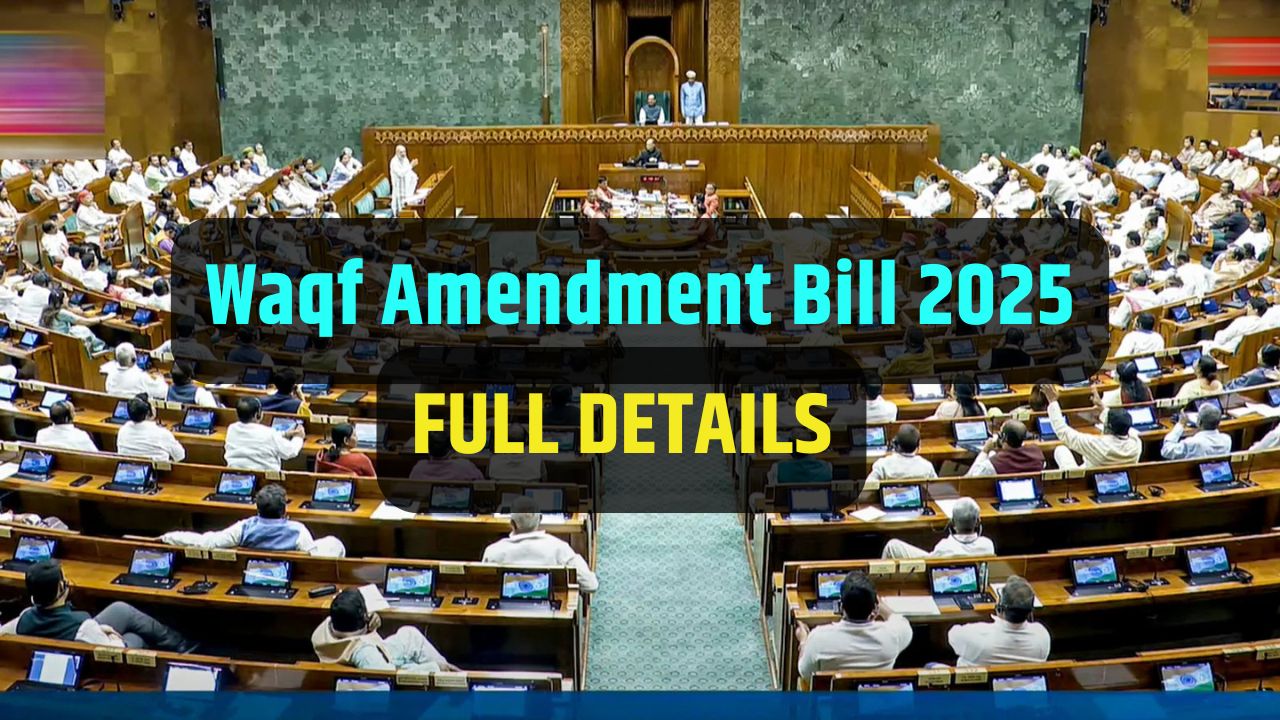Waqf Amendment Bill 2025: After an intense debate that lasted over 12 hours, the Waqf (Amendment) Bill 2025 was finally passed in the Lok Sabha late on Wednesday (April 2, 2025) with a majority vote of 288 against 232. The bill witnessed fierce opposition from rival parties, and now it is set to be presented in the Rajya Sabha today (April 3, 2025), where another heated political battle is expected.
So, what exactly is this bill, and why is it making headlines? What amendments have been proposed, and what changes will they bring? Let’s break it down in detail.
What Is the Waqf Amendment Bill 2025?
The Waqf (Amendment) Bill 2025 seeks to amend the Waqf Act of 1995 to introduce reforms aimed at improving transparency and management of waqf properties. One of the key provisions of the bill is the inclusion of non-Muslims and women in waqf boards, which has sparked debate.
While the government argues that the bill will increase transparency and prevent misuse of waqf properties, the opposition sees it as interference in religious affairs. The BJP, JD(U), and TDP support the bill, whereas parties like Congress, SP, TMC, DMK, and AIMIM have strongly opposed it. The bill comfortably passed in the Lok Sabha, but a tough battle is expected in the Rajya Sabha.
Why Did the Government Introduce This Bill?
On August 8, 2024, the government introduced two bills in the Lok Sabha:
-
Waqf (Amendment) Bill, 2024
-
Muslim Waqf (Repeal) Bill, 2024
The objective of these bills is to streamline the functioning of waqf boards and improve the management of waqf properties. The Waqf (Amendment) Bill 2025 aims to address loopholes in the existing law, improve regulation, and make waqf boards more efficient.
How Is Waqf Managed in India?
Waqf properties in India are governed under the Waqf Act, 1995. The key administrative bodies managing waqf properties include:
-
Central Waqf Council (CWC): Advises the government and state waqf boards on policy matters.
-
State Waqf Boards (SWB): Responsible for the protection and management of waqf properties within their respective states.
-
Waqf Tribunals: Handle legal disputes related to waqf properties.
What Issues Have Plagued Waqf Management?
The management of waqf properties has been controversial due to several issues:
-
“Once Waqf, Always Waqf” Rule: This principle has led to many disputes over ownership and property rights.
-
Legal and Administrative Challenges: Mismanagement, corruption, and legal battles over waqf land have been persistent problems.
-
Encroachments: Many waqf properties have been illegally occupied, leading to significant losses.
-
Lack of Transparency: The absence of proper audits and digital records has allowed corruption to flourish.
The previous amendments (including the 2013 Waqf Amendment) failed to resolve these issues effectively.
Key Changes Introduced in the Waqf Amendment Bill 2025
1. Digitalization for Transparency
A digital portal will be introduced to record and track all waqf properties, making it easier to audit funds and prevent corruption.
2. Improved Use of Waqf Funds for Public Welfare
The bill emphasizes that waqf properties and funds must be used to improve healthcare, education, housing, and employment opportunities for the underprivileged.
-
Healthcare:
-
Clinics and hospitals will be set up on waqf land to provide free or low-cost medical services.
-
Waqf funds will be used in charity partnerships to fund medical programs.
-
Expansion of essential medicines and treatments in underprivileged areas.
-
-
Education:
-
Construction and maintenance of schools and madrasas.
-
Scholarships and financial aid for poor students.
-
Establishment of vocational training centers to teach employable skills.
-
-
Affordable Housing:
-
Waqf properties will be used to build low-cost housing for the poor.
-
Shelters for the homeless will be developed.
-
Subsidized rental programs for low-income families.
-
-
Employment & Economic Empowerment:
-
Training centers for skills like carpentry, tailoring, and digital literacy.
-
Micro-loans to help people start small businesses.
-
Job placement assistance for trained workers.
-
3. Stronger Legal Protections Against Encroachments
According to WAMSI (Waqf Asset Management System of India), around 58,898 waqf properties have been illegally occupied. The bill introduces stricter legal measures to tackle this issue:
-
Reclaiming illegally occupied waqf land for social welfare projects.
-
Empowering district collectors to protect waqf properties.
-
Preventing unauthorized claims that take resources away from the needy.
4. Fairness and Inclusion
The bill ensures that waqf resources benefit all needy communities, not just a select group. It also aims to prevent disputes over non-Muslim land, ensuring that welfare projects are not disrupted by legal conflicts.
